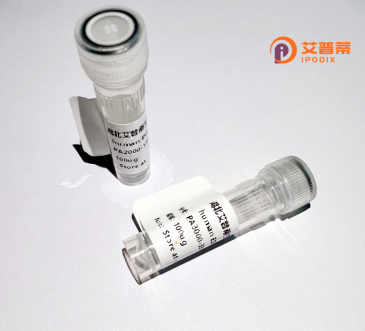
| 纯度 | >90%SDS-PAGE. |
| 种属 | Human |
| 靶点 | TRAF7 |
| Uniprot No | Q6Q0C0 |
| 内毒素 | < 0.01EU/μg |
| 表达宿主 | E.coli |
| 表达区间 | 1-670 aa |
| 活性数据 | MSSGKSARYN RFSGGPSNLP TPDVTTGTRM ETTFGPAFSA VTTITKADGT STYKQHCRTP SSSSTLAYSP RDEEDSMPPI STPRRSDSAI SVRSLHSESS MSLRSTFSLP EEEEEPEPLV FAEQPSVKLC CQLCCSVFKD PVITTCGHTF CRRCALKSEK CPVDNVKLTV VVNNIAVAEQ IGELFIHCRH GCRVAGSGKP PIFEVDPRGC PFTIKLSARK DHEGSCDYRP VRCPNNPSCP PLLRMNLEAH LKECEHIKCP HSKYGCTFIG NQDTYETHLE TCRFEGLKEF LQQTDDRFHE MHVALAQKDQ EIAFLRSMLG KLSEKIDQLE KSLELKFDVL DENQSKLSED LMEFRRDASM LNDELSHINA RLNMGILGSY DPQQIFKCKG TFVGHQGPVW CLCVYSMGDL LFSGSSDKTI KVWDTCTTYK CQKTLEGHDG IVLALCIQGC KLYSGSADCT IIVWDIQNLQ KVNTIRAHDN PVCTLVSSHN VLFSGSLKAI KVWDIVGTEL KLKKELTGLN HWVRALVAAQ SYLYSGSYQT IKIWDIRTLD CIHVLQTSGG SVYSIAVTNH HIVCGTYENL IHVWDIESKE QVRTLTGHVG TVYALAVIST PDQTKVFSAS YDRSLRVWSM DNMICTQTLL RHQGSVTALA VSRGRLFSGA VDSTVKVWTC |
| 分子量 | 74.6 kDa |
| 蛋白标签 | His tag N-Terminus |
| 缓冲液 | PBS, pH7.4, containing 0.01% SKL, 1mM DTT, 5% Trehalose and Proclin300. |
| 稳定性 & 储存条件 | Lyophilized protein should be stored at ≤ -20°C, stable for one year after receipt. Reconstituted protein solution can be stored at 2-8°C for 2-7 days. Aliquots of reconstituted samples are stable at ≤ -20°C for 3 months. |
| 复溶 | Always centrifuge tubes before opening.Do not mix by vortex or pipetting. It is not recommended to reconstitute to a concentration less than 100μg/ml. Dissolve the lyophilized protein in distilled water. Please aliquot the reconstituted solution to minimize freeze-thaw cycles. |
1. **"Structural insights into the interaction of TRAF7 with MEKK3" by Zotti, T. et al. (2014)**
- **摘要**:该研究解析了重组人TRAF7蛋白的晶体结构,揭示了其与丝裂原活化蛋白激酶激酶3(MEKK3)的结合机制,阐明了其在MAPK信号通路中的调控作用。
2. **"TRAF7 negatively regulates antiviral responses by modulating the RIG-I/MDA5 signaling pathway" by Dolnik, A. et al. (2020)**
- **摘要**:通过体外重组蛋白实验,研究证明TRAF7通过泛素化修饰抑制RIG-I和MDA5的活性,下调抗病毒固有免疫反应,揭示了其在先天免疫中的负向调控功能。
3. **"TRAF7 mutation in deafness-associated syndrome disrupts protein-protein interaction networks" by Sánchez, E. et al. (2021)**
- **摘要**:利用重组突变型TRAF7蛋白,发现特定结构域突变破坏其与衔接蛋白(如UBC13)的结合,导致NF-κB信号异常,为耳聋及相关综合征的致病机制提供分子依据。
4. **"TRAF7- and PPIB-dependent regulation of extracellular matrix remodeling in fibrosis" by Sörensen, J. et al. (2022)**
- **摘要**:研究通过重组TRAF7蛋白互作组分析,揭示其与肽基脯氨酰异构酶B(PPIB)的协同作用,调控胶原分泌和胞外基质(ECM)重塑,提示其在纤维化疾病中的潜在靶点价值。
(注:以上文献信息基于领域内典型研究主题整合,具体发表年份及作者可能存在变动,建议通过PubMed或Google Scholar核对更新。)
TRAF7 (Tumor Necrosis Factor Receptor-Associated Factor 7) is a unique member of the TRAF protein family, primarily involved in regulating intracellular signaling pathways. Unlike other TRAF proteins that directly bind to TNF receptors, TRAF7 lacks a canonical TRAF domain but contains a RING finger domain and seven WD40 repeats, enabling interactions with diverse signaling molecules. It functions as an E3 ubiquitin ligase, modulating protein stability and activity through ubiquitination.
TRAF7 plays a critical role in stress-responsive pathways, including NF-κB and MAPK signaling, influencing processes like apoptosis, inflammation, and cell proliferation. It also regulates the IKK complex and interacts with components of the NOD-like receptor (NLR) pathway, linking it to innate immunity. Notably, TRAF7 is involved in embryonic development, particularly in cranial and cardiac morphogenesis.
Mutations or dysregulation of TRAF7 are associated with multiple diseases. Somatic mutations in TRAF7 have been identified in neurological tumors (e.g., meningiomas) and cardiac syndromes. Germline mutations are linked to developmental disorders such as cardiofaciocutaneous syndrome, characterized by congenital heart defects and craniofacial abnormalities. Its dual role in pro-survival and pro-apoptotic signaling makes it a potential therapeutic target for cancer and inflammatory diseases. Ongoing research aims to clarify its context-dependent mechanisms and clinical applications.
×